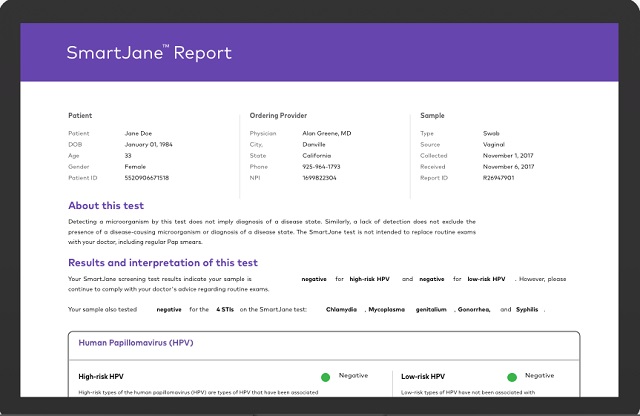This is a post written in partnership with uBiome—we’re honored to work with anyone this dedicated to empowering women to take control of their health and well-being. ~ Ed.
~
Women’s empowerment is at the forefront of our minds at the moment.
We’re having more conversations about it, we’re reading more about it in the media, activists are going along as dates to the Golden Globes, Time Magazine named the #MeToo movement Person of the Year…
Much has happened recently to push gender equality into the spotlight, and rightly so. It feels like a change has begun. We have a ways to go yet, but many of us have started to speak more openly about the issues affecting us. And while there is a lot happening in the world today that we can’t control, we’ve started to realise that we can all make a stand in small, but powerful ways for ourselves, for each other—for a healthier, safer, fairer future for all women.
One area where we continue to struggle with taboo and embarrassment, though, is our vaginal and sexual health. Many of us still find it hard to talk openly and comfortably, even with our closest friends, about anything to do with our vaginas or our sexual health. The existence of questionable or even potentially harmful fads like vaginal steaming is further proof of how many of us are totally in the dark about our own bodies. Heck, it still feels a bit awkward for many of us to even say the word vagina out loud.
It’s time for this to change. Our health and, in some cases, our lives depend on it.
January was Cervical Health Awareness month, and cervical cancer remains a major cause of cancer-related death in women, with an annual worldwide mortality of nearly 300,000. (1)
The leading cause of cervical cancer, human papillomavirus (HPV) is one of the most common sexually transmitted infections (STIs). It’s so common that most sexually active people will have HPV at some point. At any time there are approximately 79 million people in the United States with HPV. (2)
Though there’s no treatment for any of the 19 different strains of HPV (14 of which are strains that can lead to cervical cancer), when detected early enough, healthcare providers have many options for treating the diseases they can cause. The truth is, the majority of cervical cancer cases could be easily prevented with either vaccination or appropriate screening. Why then are we still dealing with this disease on such a large scale in this day and age?
Largely because we are not informed enough or empowered enough when it comes to our vaginal health. But uBiome, the leader in microbial genomics, has recently launched a product* that aims to help put an end to the dark ages of women’s sexual health.
SmartJane™ is the world’s first sequencing-based, doctor-ordered, women’s health test.
As the first test to combine HPV genotyping and STI testing with the detection of microbes that may play a role in HPV infection, bacterial vaginosis, cervicitis, infertility, pelvic inflammatory disease, bacterial vaginosis, and aerobic vaginitis, SmartJane empowers women to take back control of their vaginal health.
Okay, that’s a lot to take in there. Let’s break it down a bit:
SmartJane is a collection kit that allows us to take a vaginal sample (swab) in the comfort and privacy of our own homes, when it’s right for us, in about three minutes.
What SmartJane does
>> Tests for high-risk HPV strains, which are associated with cervical cancer and precancerous cervical lesions. It detects the two most common strains (HPV-16 and HPV-18), as well as 12 additional strains.
>> Tests for five low-risk HPV types such as HPV-6 and HPV-11. These strains are responsible for about 90% of genital warts, but they rarely develop into cancer.
>> Tests for four STIs, including chlamydia, gonorrhea, syphilis, and mycoplasma genitalium (the STI you’ve never heard about, and that might be more common than chlamydia).
>> Tells you about your vaginal flora balance—an imbalance is associated with conditions such as bacterial vaginosis (BV), a common vaginal infection.
>> Identifies the abundance of certain bacteria that are associated with HPV infection—and provides information on these bacteria related to your health.
How SmartJane™ works
- You request a test: Requesting your test is quick and easy. A few online questions, and you’re done.
~ - Your doctor reviews your request: Your own doctor can approve your test, or an independent healthcare provider from an external clinical care network can review your request.
~ - You sample at home: In a few business days, your kit will arrive in a discreet package. Clear instructions tell you how to self-sample. It’s fast and private, and takes place in the comfort of your home.
~ - Your test is processed: After you collect your sample, stick it in the prepaid envelope and drop it in the nearest mailbox. Once it’s processed in uBiome’s lab, they send you a secure link so you and your doctor can download your test results.
Learn more about how SmartJane works >>
~
This new home test kit has potentially huge implications for women’s health. Here’s why:
In the U.S., at least one in five women are not screened according to the clinical guidelines for cervical cancer screening.. Participation is especially low among low-income groups, recent immigrants, Native Americans, Hispanic, and Asian women. Reported barriers include feelings of embarrassment or shame about screening, discomfort or pain linked with a pelvic exam, economic disparities in care, and history of intimate partner violence or sexual abuse. Additional logistical challenges can also negatively impact women’s participation in cervical cancer screening programs, including limited financial, childcare, and transportation resources.
(This is true of all people with vaginas and cervices, even if they don’t identify as women.)
While SmartJane is not intended to replace traditional Pap smears or well woman visits, and is only available with a valid lab test order from a healthcare provider, vaginal self-sampling has the potential to impact these barriers to preventative care.
In one analysis of 37 studies of 18,000 women from 24 countries, 97% of women accepted self-sampling, and 59% of women expressed a preference for self-sampling over clinician sampling. (3) In addition, offering self-sampling to women who missed one or two invitations for HPV screening increased participation rates more than two-fold. (4)
Positive SmartJane results can prompt an early visit to the doctor for a timely—and potentially life-saving—follow up, diagnosis, and treatment. With test results, SmartJane provides an informative report that can then be discussed with your physician.
In other words, it gives us a tool to help us feel more comfortable, informed, and empowered in starting the conversation about our vaginal and sexual health with our doctors.
Beyond the health risk factors of HPV, there’s also emerging evidence that the balance of a healthy vaginal microbiome can prevent against disease, and may contribute to healthy development of the infant microbiome in vaginal deliveries. The other thing SmartJane can detect is an STI that most of us have probably never heard about, mycoplasma genitalium which, like other STIs, can permanently affect your fertility if it goes untreated.
Our vaginal and sexual health impacts our lives in so many ways—it is time we demystified and destigmatized it.
Take the first step to being informed and empowered when it comes to your body:
~
Request your SmartJane today >>
*currently available in the U.S. and Canada
~
Sources:
(1) National Institutes of Health
(2) National Cervical Cancer Coalition
(3) The acceptability of self-sampled screening for HPV DNA: a systematic review and meta-analysis—Nelson et al., Sex Transm Infect 2017; 93:56-61.
(4) Self-Sampling for HPV Testing: Increased cervical cancer screening participation and incorporation in international screening programs
~
Editor: Khara-Jade Warren





Read 1 comment and reply